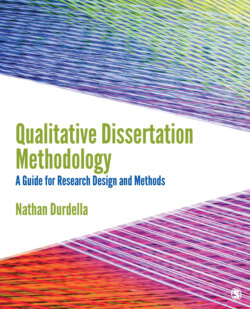Читать книгу Qualitative Dissertation Methodology - Nathan Durdella - Страница 40
На сайте Литреса книга снята с продажи.
Switching chairs or committee members when things do not work out.
ОглавлениеAs institutional departure rates of doctoral students in U.S. colleges and universities reach 50% (Lovitts, 2001; Smallwood, 2004), multiple factors explain student patterns of leaving programs. Long before the dissertation stage of a doctoral program, students socialize into systems of graduate education, meeting and entering department and program structures, resources, and staff early in their tenure in doctoral programs. These structures—the academic and social systems of departments—tend to affect doctoral student attrition (Lovitts). From study lounges to social events, students sense how people support their academic and scholarly efforts, and these program forces shape student outcomes (Lovitts & Nelson, 2000). When students feel unwelcome and detached from their programs of study and the faculty who serve as their instructors and advisors, they tend to have weaker connections to their work as doctoral students. Worse yet, if students feel that faculty exploit them, they may elect to leave temporarily or leave and do not return to their programs. On this point, Anderson and Swazey (1998) reported:
Of even greater concern, however, is the 27 percent of our respondents who reported that they often felt exploited by faculty. Exploitation is a far different matter than high expectations. If students feel overworked because they and faculty hold different views of appropriate workloads, for example, the problem could be addressed, if not solved altogether, through more direct communication or negotiation. If, however, graduate students actually experience high levels of exploitation, considerable restructuring of tasks, responsibilities, and expectations is in order.
Under these conditions, students have to feel a need to not only restructure their work but reconsider the work altogether.
While most students tend to not feel exploited, they still sense that faculty members expect a lot from them—to an unreasonable level by most measures of graduate student performance. Perhaps faculty members impose expectations of early career faculty on their students or advisees—but from students’ perspectives, there is more to it. While this practice tends to be normative in some doctoral program contexts and may be appropriate with select students in advanced stages of their programs of study, faculty demands concern other students. Indeed, Anderson and Swazey (1998) shared that over 60 percent of respondents in their survey agreed that “faculty in their department expected their responsibilities as students to come before all their other responsibilities.” From faculty perspective, relationships with advisees challenge them—perhaps for reasons related to students’ limited research skill set (Knox et al., 2011)—which may partially explain high faculty expectations and demands on students. Whatever the reasons for faculty attitudinal and behavioral patterns with doctoral students, the effects seem to isolate them and push them toward decisions to change their current course of study.
Given faculty advisor roles in doctoral student lives, the quality of a relationship with faculty remains the most significant factor in student experiences and program completion. The most obvious obstacles to completion can be tied to faculty advising—especially at the point when students move from their curricular and exam sequence to dissertation work. Whereas the effects of individual and group characteristics of faculty on students tend to be mitigated through coursework—when students work with multiple instructors and pedagogical patterns may regulate student contact with faculty—students meet faculty squarely on their terms in the dissertation. If there are substantive areas of divergence or outright hostility between faculty advisors and advisees or—especially in areas related to qualitative research methodology—students generally feel concern. At this point, students seem to be vulnerable to institutional departure—stopping out or leaving without returning to study. Indeed, Fitzpatrick, Secrist, and Wright (1998, p. 38) caution that “[i]f there are serious sparks at the beginning of the dissertation process” with a dissertation chair, “there will be major explosions as the process continues.” They go on to say that even if a student needs to re-defend a proposal, it may be worth the effort to avoid not completing. With a near-exclusive focus on the dissertation—fast forward to study conceptualization and proposal development—faculty advising takes on a critical role in student work in a program. Yes, students continue to serve as graduate student researchers and teaching assistants during this time and move into more mature student mentoring and early career roles—but their fortunes tend to be tied almost directly to their relationship with their chair.
